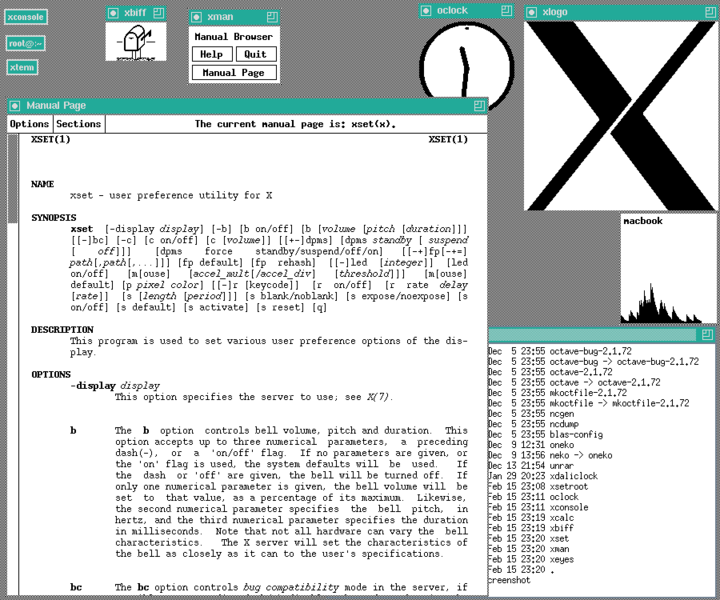Home > Apps > Linux
File extension list filtered by software name
Unix
Found 116 file extension associations related to Unix and 91 file formats developed specifically for use with Unix.
Platform: ![]() Linux/Unix
Linux/Unix
Go to: Unix description
Developer: The Open Group
 Unix
Unix
Developer / company: The Open Group
Unix operating systems are widely used in both servers and workstations. The Unix environment and the client-server program model were essential elements in the development of the Internet and the reshaping of computing as centered in networks rather than in individual computers.
Both Unix and the C programming language were developed by AT&T and distributed to government and academic institutions, causing both to be ported to a wider variety of machine families than any other operating system. As a result, Unix became synonymous with "open systems".
Unix was designed to be portable, multi-tasking and multi-user in a time-sharing configuration. Unix systems are characterized by various concepts: the use of plain text for storing data; a hierarchical file system; treating devices and certain types of inter-process communication (IPC) as files; and the use of a large number of software tools, small programs that can be strung together through a command line interpreter using pipes, as opposed to using a single monolithic program that includes all of the same functionality. These concepts are known as the Unix philosophy.
Under Unix, the "operating system" consists of many of these utilities along with the master control program, the kernel. The kernel provides services to start and stop programs, handle the file system and other common "low level" tasks that most programs share, and, perhaps most importantly, schedules access to hardware to avoid conflicts if two programs try to access the same resource or device simultaneously. To mediate such access, the kernel was given special rights on the system, leading to the division between user-space and kernel-space.
The microkernel concept was introduced in an effort to reverse the trend towards larger kernels and return to a system in which most tasks were completed by smaller utilities. In an era when a "normal" computer consisted of a hard disk for storage and a data terminal for input and output (I/O), the Unix file model worked quite well as most I/O was "linear". However, modern systems include networking and other new devices. As graphical user interfaces developed, the file model proved inadequate to the task of handling asynchronous events such as those generated by a mouse, and in the 1980s non-blocking I/O and the set of inter-process communication mechanisms was augmented (sockets, shared memory, message queues, semaphores), and functionalities such as network protocols were moved out of the kernel.
Unix icon
![]()
Unix icon
size: 128px x 128px (.png with transparency)
Search converter
Sample related conversions
 Unix works with the following file extensions:
Unix works with the following file extensions:
Note: You can click on any file extension link from the list below, to view its detailed information. The list of extensions used or otherwise associated with the application may not be complete, because many common file extensions on our website, such as jpg (pictures) or txt (text files), can be opened by a large number of applications, or are too general file format. However most, if not all directly associated file extensions should be listed with its appropriate program. Although its likely, that some file extensions may be missing from the list of associated file extensions with the application, yet they can be opened, be part of, or otherwise be associated with the program.
Unix default file extension associations
![]() .001
.001![]() .1
.1![]() .2
.2![]() .3
.3![]() .4
.4![]() .5
.5![]() .8
.8![]() .a
.a![]() .aa
.aa![]() .ad
.ad![]() .ar
.ar.au
![]() .autoconf
.autoconf![]() .bar
.bar![]() .bash
.bash![]() .bashrc
.bashrc![]() .bash_history
.bash_history![]() .bdf
.bdf![]() .bdf
.bdf![]() .bsh
.bsh![]() .c
.c![]() .ca
.ca![]() .cf
.cf![]() .common
.common![]() .conf
.conf![]() .configure
.configure![]() .cpgz
.cpgz![]() .cpio
.cpio![]() .crt
.crt![]() .cs8
.cs8![]() .csh
.csh![]() .cshrc
.cshrc![]() .data
.data![]() .ddz
.ddz![]() .exec
.exec![]() .fac
.fac![]() .face
.face![]() .file
.file![]() .font
.font![]() .gda
.gda![]() .help
.help![]() .icp
.icp![]() .image
.image![]() .info
.info![]() .io
.io![]() .jfs
.jfs![]() .keytab
.keytab![]() .ksh
.ksh![]() .l
.l![]() .lex
.lex![]() .ln
.ln![]() .login
.login![]() .ls_
.ls_![]() .m4
.m4![]() .man
.man![]() .me
.me![]() .mm
.mm![]() .mo
.mo![]() .ms
.ms![]() .msf
.msf![]() .netboot
.netboot![]() .offsets
.offsets![]() .pcf
.pcf![]() .pid
.pid![]() .plot
.plot![]() .profile
.profile![]() .pxe
.pxe![]() .pzl
.pzl![]() .roff
.roff![]() .run
.run![]() .sed
.sed![]() .sh
.sh![]() .sha
.sha![]() .shar
.shar![]() .shr
.shr![]() .sl
.sl![]() .snf
.snf![]() .so
.so![]() .sp
.sp![]() .srf
.srf![]() .ssd01
.ssd01![]() .symlink
.symlink![]() .t
.t![]() .tcsh
.tcsh![]() .tr
.tr![]() .trashinfo
.trashinfo![]() .unix
.unix![]() .unx
.unx![]() .usersettings
.usersettings![]() .w
.w![]() .y
.y
Common file extensions used by Unix
Other file extensions associated with Unix
![]() .bash_login
.bash_login![]() .bash_logout
.bash_logout![]() .bash_profile
.bash_profile![]() .bit
.bit![]() .dif
.dif![]() .fnt
.fnt![]() .fseventsd-uuid
.fseventsd-uuid![]() .fstab
.fstab![]() .gtar
.gtar![]() .mbox
.mbox![]() .mpkg
.mpkg![]() .partimg
.partimg![]() .pm
.pm![]() .s
.s![]() .sox
.sox![]() .t
.t![]() .textmate_init
.textmate_init![]() .trashes
.trashes![]() .wbm
.wbm![]() .wrapper
.wrapper![]() .zsh
.zsh


